Poland-Belarus crisis: The lives caught in a stalemate
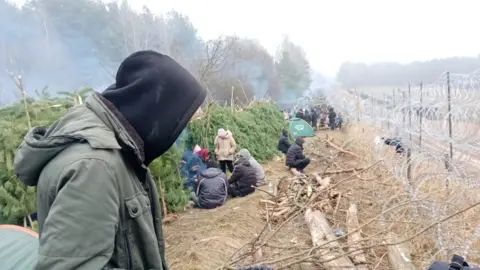 Shwan Kurd
Shwan KurdFor almost two weeks, Shwan Kurd has been stuck in limbo. The 33-year-old from Iraq is one of thousands of migrants currently stranded at the Belarus-Poland border.
They have been caught up in a political tussle between the European Union and Belarus's leader, Alexander Lukashenko. He has been accused of funnelling migrants through Belarus to destabilise EU nations in revenge for sanctions - something his government denies.
Cold, hungry and exhausted, Mr Kurd is convinced Poland will let him cross the border, allowing him to seek a new life of opportunities in the EU.
Between him and that life stands a forbidding barbed-wire fence and hundreds of Polish soldiers. In a landscape reminiscent of a war zone, the crisis on the Poland-Belarus border has reached a chaotic stalemate.
"We're still at the border line," Mr Kurd told the BBC on Thursday. "There are so many Polish soldiers."
Those soldiers have markedly increased in number since a large group of migrants attempted to cross the border on Monday. The group came from the capital, Minsk, and converged on a crossing at Kuznica, near Grodno in north-west Belarus.
There, some migrants tried to force their way through Poland's barrier, using tools to cut the barbed wire.
Poland accused Belarusian border guards of helping them, calling it a major provocation. While some migrants managed to slip through, most did not, leaving them with few options.
Poland won't let them cross but, according to some migrants, nor will Belarusian border guards allow them to return to Minsk either. Unsure about where to turn next, many of the migrants have settled in a make-shift camp near the Kuznica crossing.
Mr Kurd spoke to us from the camp, where he had been sleeping for days in freezing overnight temperatures, metres from Poland's barbed-wire fence.
"We need supplies, there are children here. No food has been given to us," Mr Kurd said.
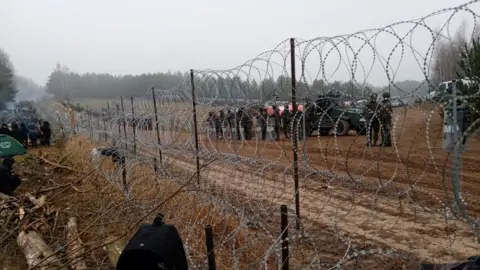 Shwan Kurd
Shwan KurdJournalists and aid groups say they have not been able to access the area since Poland declared a state of emergency on its border with Belarus in September. The measure gave Poland powers to restrict the movement of people along the frontier.
Aras Nader, a British-Iraq, has been working as an interpreter for Grupa Granica, a network of Polish NGOs. He told the BBC he attempted to reach the border recently to find his wife and children, who were on the Belarusian side.
"I begged the police because my family is stuck. I told them on the phone, they are hungry, they don't have anything," he said.
"I just asked them to let me through with food and water. But they didn't let me and asked me to pay a fine."
His family eventually managed to get through the border despite the strict controls, which haven't stopped migrants arriving in ever-greater numbers.


Mr Kurd said he flew to Minsk from the Iraqi capital Baghdad at the start of November.
He said there was no work for him in his country, which has been ripped apart by war in recent decades and has an economy that's heavily dependent on oil.
"We have nothing. There's no life in our country," he said. "We hope to arrive and enjoy life, that's all. We want to do our jobs. We have so many good people - doctors, scientists, teachers."
Mr Kurd may soon be followed by many others. Some 300km (186 miles) from the Polish border in Minsk, many more migrants are preparing to tread the same uncertain path.
By Tuesday morning, about 300 mostly Iraqi migrants had gathered in Minsk's central square.
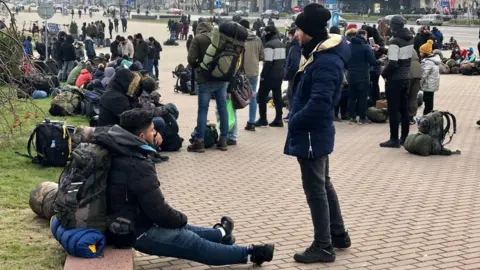
BBC journalist Will Vernon spoke to several of them in the square. Their stories were all the same. They were waiting, they said, to go to the Polish border - a four-hour drive away, at least.
They said they had paid for a visa and flights as part of a package costing several thousand dollars.
Mazyar and his friends, from Iraq, said they paid about $3,000-4,000 (£2,200-2,900). "We want to get to Germany or the UK," he said.
Others on the square alleged they had been beaten and badly treated by Belarus police officers and soldiers, who had tried to force them towards neighbouring Lithuania instead of Poland.
One man said he had been sleeping on the street, braving Minsk's sub-zero night-time temperatures.
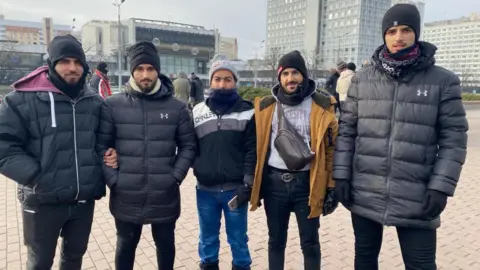
The EU has accused Belarus of enticing these migrants with the false promise of easy entry to its member states. They are flown in and pushed towards the border by Belarusian forces as part of an "inhuman, gangster-style approach", the EU has alleged.
This week, as the crisis reached fever pitch, the EU listed some 20 countries from which migrants have flown into Minsk, mainly on tourist visas. Many have come from countries in Asia and the Middle East, particularly Iraq.
Earlier this year, the BBC followed the journey of one group from Iraq to the EU via Belarus. They bought their visas and flights from a travel agency in Iraq before paying smugglers to take them to the border.
They made it to EU countries, but others are not so fortunate.
On the Belarusian side of the border, the mood flickers between hope and desperation. For Mr Kurd, the new life he covets is so close, yet so far.
"So many people's lives are in danger if we don't arrive," Mr Kurd said.
"So many little children and old people. Some people are sick, some people can't walk. But there are no supplies and no medicine here. Every night, the temperature is under zero. It's so, so cold."
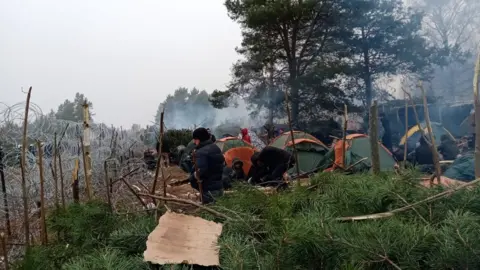 Shwan Kurd
Shwan Kurd